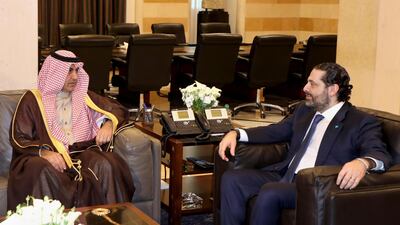Lebanese MPs aired long-standing grievances during two days of sometimes heated discussion on the ministerial statement outlining the new government’s policies. The debate, which was broadcast live, is largely considered to be an exercise in rhetoric as the government is assured of winning a vote of confidence later this week.
The government drew up the policy statement one week after being formed on January 31, following nearly nine months of stalemate, and now needs parliament’s approval to get to work.
Prime Minister Saad Hariri opened the session on Tuesday by reading out the statement and promising “a government of bold decisions and reforms”.
“We want this government to be a government of action, not of words," the state-run National News Agency (NNA) quoted him as telling the MPs. “A government that addresses the causes of administrative imbalance, of financial corruption and tax evasion."
Mr Hariri reaffirmed Lebanon’s commitment to economic reforms pledged at an international investment conference held last April in Paris. He has admitted that the reforms will be “difficult and painful”.
Several MPs said they would not approve the policy statement and criticised the government for making promises it had failed to keep previously with the same parties in power. “The worst thing in your statement is that you deny the paternity of the [current] crisis," said Ossama Saad, an MP for the centre-left pan-Arabist Popular Nasserist Organisation.
"I know that the same forces have made the same promises over the years,” MP Paula Yacoubian said on Wednesday.
The MP, who is affiliated with the Sabaa party that arose from the civic activist movement, recalled earlier promises to cut public debt – made at the Paris 1, 2 and 3 conferences to help Lebanon in the early 2000s – “which doubled from $41 billion to reach an amount probably close to $100 billion”.
Lebanon’s debt-to-GDP ratio of about 150 per cent is one of the highest in the world, much of it accumulated through the cost of servicing existing debt.
Mrs Yacoubian also attacked MP Hassan Fadlallah for his promise on Tuesday that his Hezbollah party would wage a “battle” against corruption, and his citing of the recruitment of more than 5,000 employees in the past year, despite a hiring freeze, as an a example.
“You know that Hezbollah is complicit in this,” she said.
Lebanon’s sectarian power structure, which means that the government must allocate equal representation to Christians, Sunni Muslims and Shia Muslims, encourages nepotism and is routinely criticised by politicians, but to little effect.
Mr Fadlallah also said that reforms should “start at the top and not the bottom” and criticised the role of Lebanese banks, calling on the government to have a “serious talk” with them “to reduce the cost of debt”.
Hezbollah, a heavily armed Shiite group backed by Iran, has three ministers in the 30-member cabinet instead of the usual two for the first time since 2005, including the powerful health ministry. The visit of Iranian Foreign Minister Mohammad Javad Zarif on Sunday and Monday, during which he offered economic and military help to Lebanon, was widely seen as Iran reaffirming its influence in Lebanon.
Sami Gemayel, an MP of the Kataeb party, triggered a row on Wednesday when he accused Hezbollah of controlling the government. Nawwaf Musawi’s response in defence of his party was cut short by another Kataeb MP, Nadim Gemayel, prompting Mr Musawi to tell him to "shut up". He also accused Mr Gemayel's father, Bashir Gemayel, of being allied with Israel, which Lebanon is technically still at war with. The elder Gemayel was assassinated in 1982, the year Israel invaded Lebanon, just after being elected president. The three Kataeb MPs said they would not approve the ministerial statement.
In addition to this, an independent MP considered to be close to Hezbollah, Jamil Sayyed, got into a fight with Finance Minister Ali Hassan Khalil, a prominent member of Amal movement and also a Hezbollah ally, on Tuesday.
Mr Sayyed used to head Lebanon’s powerful General Security before spending four years in prison for his alleged role in the 2005 assassination of Mr Hariri’s father, then prime minister Rafiq Hariri.
The current prime minister, who has held the post since his father's killing, walked out with the MP Bahia Hariri, who is his aunt, during Mr Sayyed’s outburst.
However, some of Hezbollah's political rivals argue that the group is not as strong as it appears. The Iranian foreign minister's offer to arm the Lebanese army and sell medicine to Lebanon has yielded no tangible results, argued Samir Geagea, leader of the Lebanese Forces party, in an interview with Asharq Al Awsat. "Right now, no one confronts [Iran] because no one wants to, but that does not mean that Iran has won," he said.
Since the end of the 1975-1990 civil war, the Lebanese army has been strongly supported by the US, which is hostile to Iran. The US embassy in Lebanon announced on Wednesday the shipment of Advanced Precision Kill Weapon System laser-guided rockets worth more than $16 million. It reiterated the US government’s "firm and steady commitment" to support the Lebanese Armed Forces in their capacity as "the sole, legitimate defender of Lebanon”, an allusion to Hezbollah, which the US deems a terrorist organisation.
Iran’s influence in Lebanon is traditionally countered by US ally Saudi Arabia, which sent a top envoy to Beirut on Tuesday. “The Iranian path is completely different from the Saudi path and neither competes with it nor does it oppose it," said Nizar Al Aloula, adviser to the Saudi royal court.
He also dismissed rumours in Lebanese media that the kingdom had a “financial surprise” for Lebanon. “Today’s visit is to congratulate Lebanon for forming a government," the NNA quoted him as saying.


